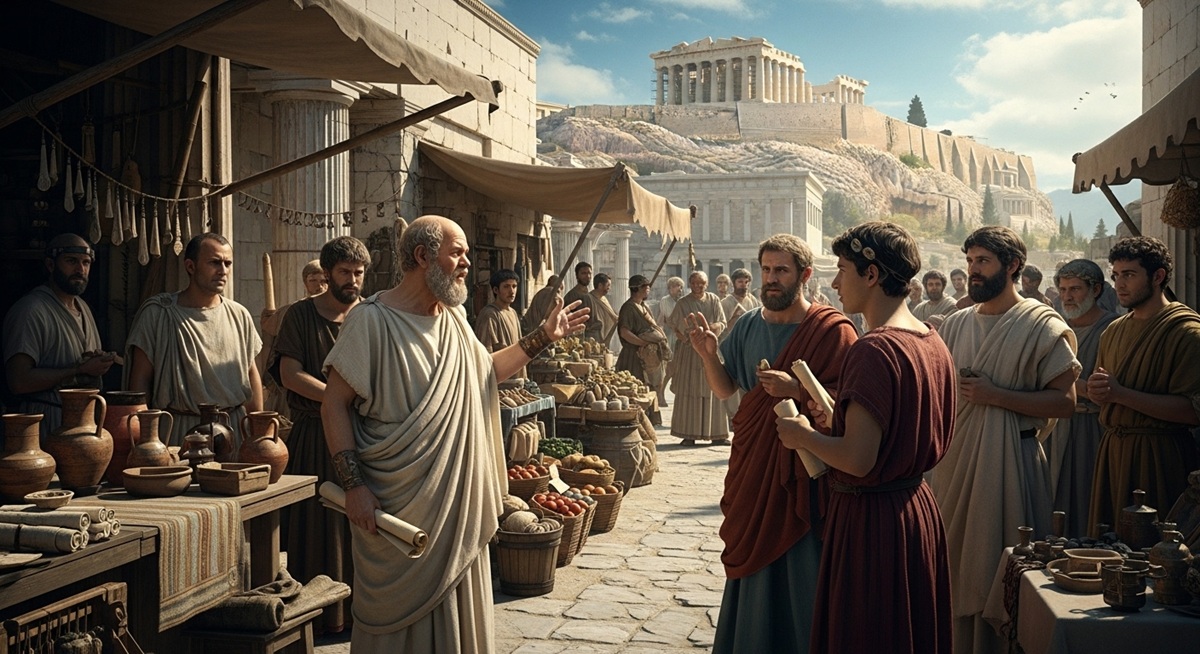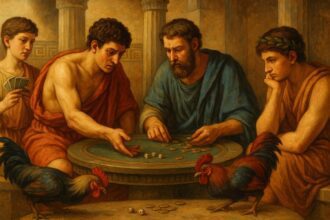Picture this: You’re wandering through the bustling streets of ancient Athens, the air thick with the chatter of merchants, the distant hum of philosophical debates echoing from the agora. In this vibrant world of the 5th century BC, knowledge wasn’t something you could pull up on your smartphone or order with one-click delivery. No, in the time of Socrates, reading was a rare privilege, a communal ritual, and often a public spectacle. Books, or more accurately, scrolls, weren’t mass-produced paperbacks but painstakingly crafted artifacts, guarded like family heirlooms.
In today’s hyper-connected society, where e-books and audiobooks flood our devices, it’s easy to forget that reading once demanded effort, resources, and a touch of reverence. For the average Athenian, be they farmer, artisan, or even some citizens, ancient Greece was a realm ruled by the voice, not the page. Socrates, that iconic figure of inquiry and irony, embodied this oral ethos perfectly. He roamed the city barefoot, engaging passersby in Socratic dialogues that peeled back layers of assumption. But to truly grasp his world, we need to rewind to the roots of Greek philosophy and explore how the written word slowly but surely began to carve out its place amid the symphony of spoken discourse.
From Oral Tradition to Written Text: The Dawn of a Literary Revolution
Let’s start at the beginning—or at least, as close to it as we can get. The history of reading in ancient Greece is inseparable from the oral tradition that birthed some of the Western world’s greatest stories. Think of the epic tales of Homer, whose Iliad and Odyssey weren’t scribbled down in a quiet study but composed and passed down through generations of rhapsodes, professional reciters who could memorize and perform thousands of verses on the fly. These bards weren’t just entertainers; they were living libraries, weaving in improvisational flair to keep audiences hooked during festivals or symposia. The rhythm of dactylic hexameter, the repetition of epithets like “swift-footed Achilles,” served as mnemonic anchors, ensuring the epics survived without a single scrap of papyrus.
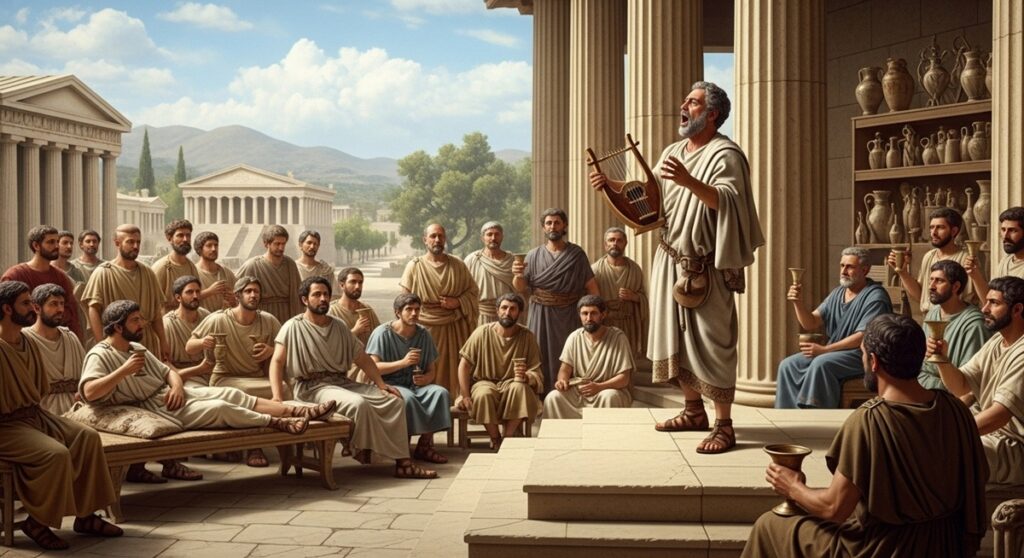
But writing? It was there, lurking in the shadows. The Greeks adapted the Phoenician alphabet around the 8th century BC, turning it into a tool for scratching out poetry and prose. Yet, for centuries, it remained a utilitarian sidekick—etching treaties on stone tablets, tallying olive oil shipments, or inscribing dedications on temple walls. The real magic happened in the telling, not the telling-over. Public performances at the Panathenaic festival, for instance, turned the recitation of Homer into a civic duty, reinforcing shared identity and moral lessons through the power of the voice.
Socrates and the Perils of the Written Word
Enter Socrates, the gadfly of Athens, who viewed this emerging reliance on writing with a healthy dose of suspicion. Immortalized through his student Plato‘s dialogues, Socrates delivers one of the most poignant critiques of literacy in the Phaedrus. There, he recounts a myth from the Egyptian god Theuth, inventor of writing, only for King Thamus to warn that it would create “forgetfulness in the learners’ souls” by offloading memory to external symbols. Socrates echoes this: the written word is static, unresponsive, like a book that can’t defend itself against misinterpretation or grill you with counterquestions. In live dialogue, ideas clash and evolve; on a scroll, they’re frozen, vulnerable to distortion.
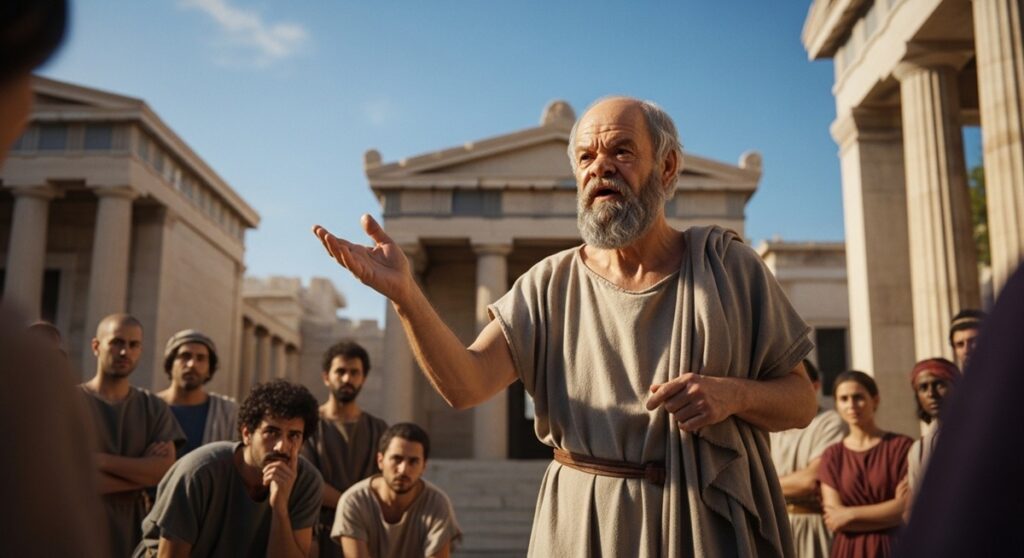
This wasn’t mere Luddite grumbling. Socrates never committed his thoughts to writing, preferring the dynamic push-pull of conversation. His method—elenchus, or cross-examination—thrived on immediacy, on the speaker’s tone, gestures, and the crowd’s reactions. Yet, ironically, we know Socrates only because Plato did write him down, turning oral wisdom into enduring text. This tension highlights a profound cultural pivot: as ancient Athens grappled with democracy’s demands for records and laws, writing gained traction among the elite.
The Rise of Plato and Aristotle: Scribes and Scrolls Enter the Spotlight
By the late 5th and early 4th centuries BC, the tide was turning. Plato, founding the Academy around 387 BC, began producing dialogues that blended drama and philosophy, all meticulously inscribed on scrolls. These weren’t for casual flipping; they were dense, demanding reads meant for repeated study and discussion. Aristotle, Plato‘s star pupil, took it further, amassing a staggering collection of treatises on everything from ethics to zoology. His works, like the Nicomachean Ethics, were lecture notes expanded into scrolls, copied and recopied for his Lyceum students.

This era marked the birth of Greek philosophy as a written discipline, but it was far from democratized. Scribes, often enslaved or lowly-paid laborers, hunched over wax tablets or papyrus, their reed pens dipping into ink made from soot and gum. Errors crept in, and ownership was a status symbol. A complete set of Plato‘s works might cost as much as a small farm, limiting access to the symposia of the rich or the rare public recitations.
The Economics of a Scroll: Luxury, Labor, and Legacy
Now, let’s get practical, or as practical as one can with artifacts from over 2,400 years ago. What did it take to produce a single book in Socrates‘ Athens? The answer: a fortune in time, materials, and manpower. Papyrus, the go-to medium, was harvested from the Nile Delta in Egypt, stripped into thin sheets, and glued into rolls up to 30 feet long. Importing it to Greece added layers of expense and fragility—dampness could ruin a scroll in days.
Crafting a Papyrus Scroll: From Reed to Revelation
The process was artisanal alchemy. Wet papyrus strips crossed and pressed, then burnished smooth. Ink? A mix of carbon black, water, and a binder like egg yolk or resin. A scribe’s hand had to be steady; one slip, and a philosophical gem became gibberish. For a major work like Aristotle‘s Politics, you’d need multiple sheets stitched together, stored in leather cases or wooden boxes to ward off rodents and moths. The labor? Days or weeks for a skilled copyist, who might charge a drachma per hundred lines, enough to feed a family for a week.

This scarcity turned scrolls into status symbols. Private libraries were the domain of the uber-wealthy, like the orator Isocrates, who boasted hundreds of volumes. But even he likely read them aloud to pupils, as solo perusal was inefficient and, frankly, lonely. Sharing wasn’t just generous; it was essential. A single acquisition could launch a teaching career, with the owner reciting passages during evening gatherings, sparking debates that echoed Socrates‘ own style.
Communal Access: The Birth of Intellectual Hubs
For those without means, options were slim. Travelers might hitch a ride to collections in Rhodes or Pergamon, but the gold standard was the Library of Alexandria, founded around 300 BC by Ptolemy I. Housing up to 700,000 scrolls by its peak, it wasn’t a dusty archive but a buzzing ecosystem. Scholars like Euclid and Eratosthenes lived there, copying texts, cross-referencing ideas, and even dissecting scrolls for hidden layers (literally—some had writing on both sides). Pirates were known to raid ships for cargo holds full of books, underscoring their value. In ancient Athens, proto-libraries existed in temples or gymnasia, where citizens could hear works read during festivals. This communal model democratized knowledge somewhat, but literacy rates hovered around 10-20% for men, near zero for women and slaves.
The economics rippled through society. A scroll’s price, equivalent to 10-20 days’ wages for a laborer, meant books were investments, not impulses. Theft was rampant; Aristophanes jokes about plagiarists in his plays. Yet, this exclusivity fueled innovation: shorthand notations sped up copying, and early catalogs like Callimachus’ Pinakes organized the chaos, paving the way for future libraries.
Reading Aloud: The Rhythm of Knowledge in Ancient Greece
Fast-forward to someone actually engaging with a scroll. Was it a silent whisper with eyes only, like we do on subways today? Hardly. In ancient Greece, reading was performative, a vocal bridge between text and mind. The verb anagignōskein—to read—implies re-knowing, often through recitation. Augustine, centuries later, marveled at Ambrose of Milan reading silently, calling it a novelty. For Greeks, words needed air to breathe life.
The Mechanics and Magic of Vocal Reading
Why aloud? Practicality first: Unpunctuated Greek script ran continuously, no spaces between words. Sounding it out clarified meaning. But deeper, it engaged the whole self. Aristotle noted that hearing reinforces retention; the ear, mouth, and memory formed a triad. In solitude, a philosopher might murmur to himself, processing Socrates‘ paradoxes. In company, it became theater—cadences rising for drama, pausing for emphasis.
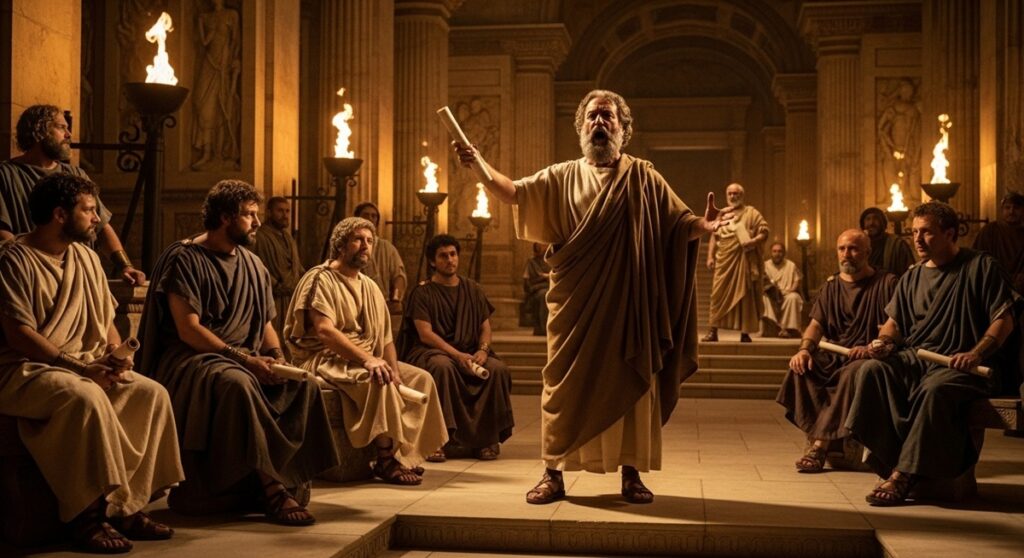
Publicly, this shone in the theater of Dionysus, where tragedies by Sophocles were declaimed to thousands. Even legal speeches in court were read from scrolls, blending oratory with literacy. This auditory emphasis shaped Greek philosophy: Ideas weren’t solitary musings but social sparks, debated under olive trees or in porticoes.
Echoes in Oral Tradition and Modern Echoes
The oral tradition lingered, influencing everything from epic cycles to folk tales. Even as writing proliferated, it complemented speech, Plato‘s dialogues mimic conversations, begging to be voiced. Today, podcasts and audiobooks nod to this heritage, proving the spoken word’s enduring pull. But in Socrates‘ Athens, it was necessity, not choice, binding community through shared sound.
The Spoken Word‘s Dominion: Debates and Dialogues in the Agora
To fully appreciate the age of Socrates, we can’t ignore the agora, the marketplace-cum-forum where democracy and discourse intertwined. Here, the spoken word reigned supreme. Socrates accosted sophists and statesmen, his questions slicing through pretension like a well-honed blade. This oral arena fostered Greek philosophy‘s dialectical core, where truth emerged from friction, not ink.
Socrates‘ Method: Questioning Without Quills

His elenchus was pure theater: “What is justice?” he’d probe, drawing out contradictions until the interlocutor crumbled. No notes needed; memory and wit sufficed. Aristophanes lampooned him in The Clouds as a charlatan aloft in a basket, but the real Socrates grounded philosophy in everyday talk. Posthumously, his trial, recorded by Plato, shows oratory’s power: Accusations flew verbally, defenses too, sealing his fate with words alone.
From Marketplace to Academy: The Evolution of Discourse
As writing crept in, spaces evolved. Plato‘s Academy hosted readings interspersed with talks, while Aristotle‘s Peripatetic school strolled and discussed, scrolls in tow. Yet, the spoken word remained the spark, texts as prompts for live exploration. This hybrid birthed enduring works, from Euclid’s geometry proofs to Hippocratic medical oaths, all rooted in oral exchange.
Literacy and Society: Who Could Read in Ancient Athens?
Delving deeper into social fabrics, literacy in ancient Athens was no egalitarian boon. Estimates suggest 5-10% of the population could parse texts fluently, skewed toward freeborn males of means. Slaves handled basic tallies, women managed household scripts if at all. This divide amplified class tensions: The unlettered relied on reciters, while elites hoarded scrolls.
Barriers to Literacy: Education’s Uneven Spread
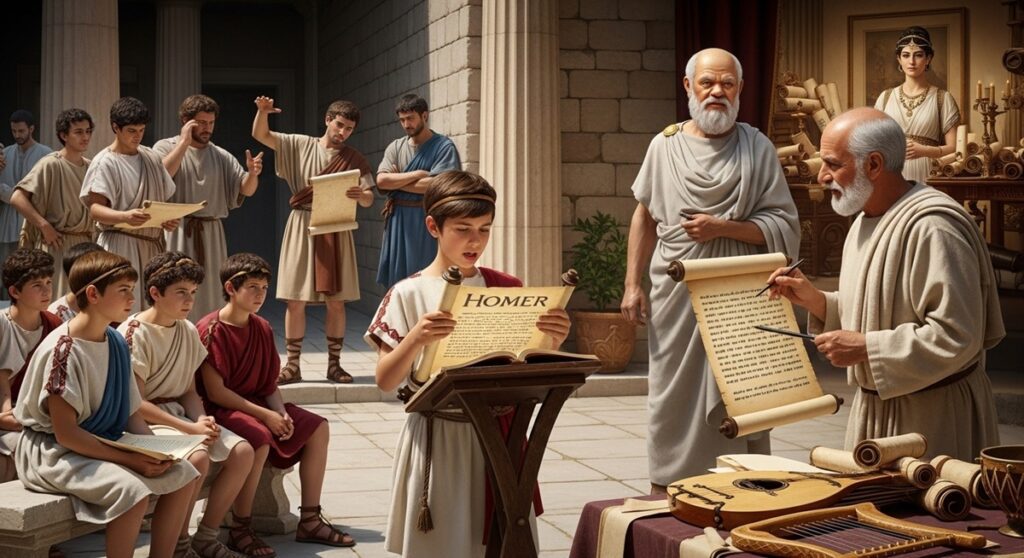
Boys from citizen families attended schools—didaskaleion—for grammar and music, learning to read Homer aloud. But for the poor or metics (resident foreigners), it was hit-or-miss. Socrates, ironically illiterate by some accounts, transcended this via sheer intellect. Women like Aspasia, Pericles’ consort, bucked norms, influencing through wit rather than writing. This landscape made reading a gateway to power, fueling Plato‘s philosopher-kings ideal.
Implications for Greek Philosophy and Democracy
Low literacy didn’t stifle thought; it channeled it orally, making democracy participatory—votes by show of hands, laws proclaimed. But as empire grew, writing standardized: Codified laws under Draco and Solon reduced reliance on memory. Aristotle‘s Constitution of the Athenians (rediscovered in modern times) exemplifies this archival turn, preserving polity for posterity.
The Lasting Influence: How the Written Word Transformed Greek Philosophy
Despite Socrates‘ qualms, writing immortalized Greek philosophy. Plato‘s dialogues preserved Socratic essence, while Aristotle‘s systematization influenced medieval scholastics to the Enlightenment. Scrolls enabled cross-pollination, Hellenistic libraries disseminated ideas to Rome, Byzantium, and beyond.
Preservation and Perils: The Fragile Legacy of Scrolls
Fires, wars, and time ravaged many; only fragments of Aristotle survive via Arabic translations. Yet, survivors like the Republic underscore writing’s double edge: It democratized access (eventually) but risked superficiality, as Socrates feared.
Bridges to the Modern World: Lessons from the Scroll
In our scroll-swipe era—ironic, isn’t it?—we echo ancient tensions. Algorithms curate our “libraries,” but deep reading wanes. The age of Socrates reminds us: True wisdom blooms in dialogue, whether spoken or shared. Reclaim the spoken word—discuss a book with friends—and honor that hard-won treasure.
Stepping back from the sun-baked stoas of ancient Athens, we’re left with a profound gratitude. The papyrus scroll, once a luxury beyond most dreams, birthed the intellectual fire that lights our world. In an age where information overflows, let’s cherish the deliberate act of engaging, aloud or in silence, with the ideas that Socrates, Plato, and Aristotle ignited. It’s a reminder that knowledge, at its core, is a shared human endeavor, as vital now as it was then.







